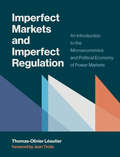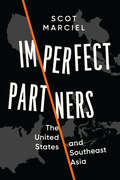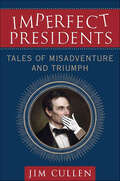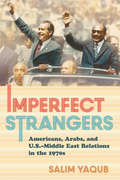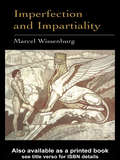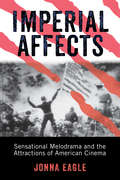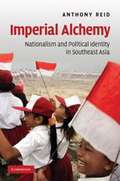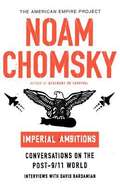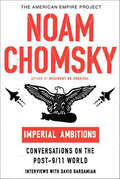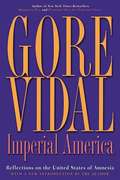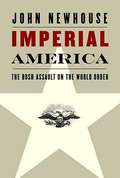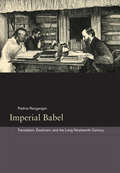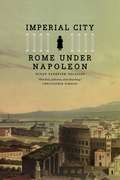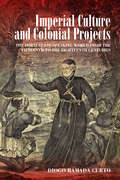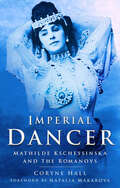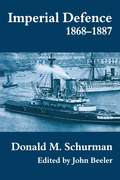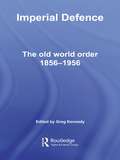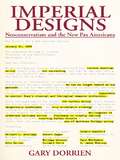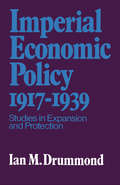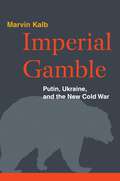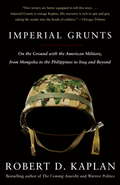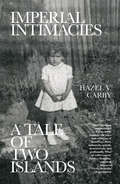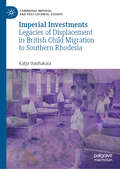- Table View
- List View
Imperfect Markets and Imperfect Regulation: An Introduction to the Microeconomics and Political Economy of Power Markets (The\mit Press Ser.)
by Thomas-Olivier LeautierThe first textbook to present a comprehensive and detailed economic analysis of electricity markets, analyzing the tensions between microeconomics and political economy.The power industry is essential in our fight against climate change. This book is the first to examine in detail the microeconomics underlying power markets, stemming from peak-load pricing, by which prices are low when the installed generation capacity exceeds demand but can rise a hundred times higher when demand is equal to installed capacity. The outcome of peak-load pricing is often difficult to accept politically, and the book explores the tensions between microeconomics and political economy. Understanding peak-load pricing and its implications is essential for designing robust policies and making sound investment decisions. Thomas-Olivier Léautier presents the model in its simplest form, and introduces additional features as different issues are presented. The book covers all segments of electricity markets: electricity generation, under perfect and imperfect competition; retail competition and demand response; transmission pricing, transmission congestion management, and transmission constraints; and the current policy issues arising from the entry of renewables into the market and capacity mechanisms. Combining anecdotes and analysis of real situations with rigorous analytical modeling, each chapter analyzes one specific issue, first presenting findings in nontechnical terms accessible to policy practitioners and graduate students in management or public policy and then presenting a more mathematical analytical exposition for students and researchers specializing in the economics of electricity markets and for those who want to understand and apply the underlying models.
Imperfect Partners: The United States and Southeast Asia
by Scot MarcielImperfect Partners is a unique hybrid – part memoir, part foreign policy study of U.S. relations with Southeast Asia, a critically important region that has become the central arena in the global U.S.-China competition. From the People Power revolt in the Philippines to the opening of diplomatic relations with Vietnam, from building a partnership with newly democratic Indonesia to responding to genocide in Myanmar and coups in Thailand, Scot Marciel was present and involved. His direct involvement and deep knowledge of the region, along with his extensive policymaking work in Washington, allows him to bring to life the complexities and realities of key events and U.S. responses, along with rare insights into U.S. foreign policy decisionmaking and the work of American diplomats in the field.
Imperfect Presidents: Tales of Misadventure and Triumph
by Jim CullenWhen people make bad decisions, odd remarks, and just plain silly mistakes, the results are sure to haunt them. But when these things happen to the president of the United States, they can change the course of history. In this clever portrait of the American presidency, Jim Cullen takes ten presidents down from their pedestals by examining key missteps in their careers--and how they transcended them. Examples include Abraham Lincoln smearing a preacher and rediscovering his religious vision in emancipating slaves; Lyndon Johnson's electoral fraud in his 1948 Senate race and his role in the signing of the Voting Rights Act; and Ronald Reagan's subversion of the Constitution in the Iran-Contra affair and affirmation of world peace in helping bring about the end of the Cold War. Targeting Republicans and Democrats alike, Cullen's insights are surprisingly timely and hugely entertaining.
Imperfect Strangers: Americans, Arabs, and U.S.–Middle East Relations in the 1970s
by Salim YaqubIn Imperfect Strangers, Salim Yaqub argues that the 1970s were a pivotal decade for U.S.-Arab relations, whether at the upper levels of diplomacy, in street-level interactions, or in the realm of the imagination. In those years, Americans and Arabs came to know each other as never before. With Western Europe's imperial legacy fading in the Middle East, American commerce and investment spread throughout the Arab world. The United States strengthened its strategic ties to some Arab states, even as it drew closer to Israel. Maneuvering Moscow to the sidelines, Washington placed itself at the center of Arab-Israeli diplomacy. Meanwhile, the rise of international terrorism, the Arab oil embargo and related increases in the price of oil, and expanding immigration from the Middle East forced Americans to pay closer attention to the Arab world.Yaqub combines insights from diplomatic, political, cultural, and immigration history to chronicle the activities of a wide array of American and Arab actors—political leaders, diplomats, warriors, activists, scholars, businesspeople, novelists, and others. He shows that growing interdependence raised hopes for a broad political accommodation between the two societies. Yet a series of disruptions in the second half of the decade thwarted such prospects. Arabs recoiled from a U.S.-brokered peace process that fortified Israel’s occupation of Arab land. Americans grew increasingly resentful of Arab oil pressures, attitudes dovetailing with broader anti-Muslim sentiments aroused by the Iranian hostage crisis. At the same time, elements of the U.S. intelligentsia became more respectful of Arab perspectives as a newly assertive Arab American community emerged into political life. These patterns left a contradictory legacy of estrangement and accommodation that continued in later decades and remains with us today.
Imperfection and Impartiality: A Liberal Theory Of Social Justice
by Marcel L.J. WissenburgThis text argues, from a liberal perspective, for a radical re- interpretation of existing ideas concerning social justice. Since the 1980s there has been debate between liberals and their critics, Concerning The Use Of Impartiality As A Notion On Which To Base Social theories of justice. In introducing an impartial standard of the right, the implications are often sexist, anthropocentric, capitalistic and oppressive. Wissenberg argues that this does not mean we should abandon the ideal of impartiality and defends the thesis that impartiality and the liberal project can be saved.; The book explores a liberal theory of Justice That Takes The Core Notion Of Impartiality Seriously; That Takes account of moral pluralism without trying to downgrade it or reduce it to the rank of a secondary problem; that argues for principles of justice Respecting Individual Notions Of The Good Life Rather Than Reformulating them in terms of one universal measure of the good or the right; that cherishes plurality, diversity and tolerance instead of uniformity and moral indifference.
Imperial Affects: Sensational Melodrama and the Attractions of American Cinema
by Jonna EagleImperial Affects is the first sustained account of American action-based cinema as melodrama. From the earliest war films through the Hollywood Western and the late-century action cinema, imperialist violence and mobility have been produced as sites of both visceral pleasure and moral virtue. Suffering and omnipotence operate as twinned affects in this context, inviting identification with an American national subject constituted as both victimized and invincible—a powerful and persistent conjunction traced here across a century of cinema.
Imperial Alchemy
by Anthony ReidThe mid-twentieth century marked one of the greatest watersheds of Asian history, when a range of imperial constructs were declared to be nation-states, either by revolution or decolonisation. Nationalism was the great alchemist, turning the base metal of empire into the gold of nations. To achieve such a transformation from the immense diversity of these Asian empires required a different set of forces from those that Europeans had needed in their transitions from multi-ethnic empires to culturally homogeneous nations. In this book Anthony Reid explores the mysterious alchemy by which new political identities have been formed. Taking Southeast Asia as his example, Reid tests contemporary theory about the relation between modernity, nationalism, and ethnic identity. Grappling with concepts emanating from a very different European experience of nationalism, Reid develops his own typology to better fit the formation of political identities such as the Indonesian, Malay, Chinese, Acehnese, Batak and Kadazan.
Imperial Ambitions: Conversations on the Post-9/11 World
by Noam Chomsky David Barsamian[From the book cover] Timely, illuminating, and urgently needed, this volume of interviews conducted by award-winning radio journalist David Barsamian features Noam Chomsky discussing U.S. policies in the increasingly unstable post-9/11 world. In these exchanges, appearing for the first time in print, Chomsky offers his frank, provocative, and informed views on the invasion and occupation of Iraq, the doctrine of preemptive strikes against so-called rogue states, and the growing threat to international peace posed by the U.S. drive for domination. In his inimitable style, Chomsky also dissects the propaganda system that fabricates a mythic past and airbrushes inconvenient facts out of history.
Imperial Ambitions: Conversations on the Post-9/11 World (The American Empire Project)
by Noam ChomskyIn this first collection of interviews since the bestselling 9-11, our foremost intellectual activist examines crucial new questions of U.S. foreign policyTimely, urgent, and powerfully elucidating, this important volume of previously unpublished interviews conducted by award-winning radio journalist David Barsamian features Noam Chomsky discussing America's policies in an increasingly unstable world. With his famous insight, lucidity, and redoubtable grasp of history, Chomsky offers his views on the invasion and occupation of Iraq, the doctrine of "preemptive" strikes against so-called rogue states, and the prospects of the second Bush administration, warning of the growing threat to international peace posed by the U.S. drive for domination. In his inimitable style, Chomsky also dissects the propaganda system that fabricates a mythic past and airbrushes inconvenient facts out of history.Barsamian, recipient of the ACLU's Upton Sinclair Award for independent journalism, has conducted more interviews and radio broadcasts with Chomsky than has any other journalist. Enriched by their unique rapport, Imperial Ambitions explores topics Chomsky has never before discussed, among them the 2004 presidential campaign and election, the future of Social Security, and the increasing threat, including devastating weather patterns, of global warming. The result is an illuminating dialogue with one of the leading thinkers of our time—and a startling picture of the turbulent times in which we live.
Imperial America: Reflections on the United States of Amnesia
by Gore VidalGore Vidal has been described as the last 'noble defender" of the American republic. In Imperial America, Vidal steals the thunder of a right wing America--those who have camouflaged their extremist rhetoric in the Old Glory and the Red, White, and Blue--by demonstrating that those whose protest arbitrary and secret government, those who defend the bill of rights, those who seek to restrain America's international power, are the true patriots. "Those Americans who refuse to plunge blindly into the maelstrom of European and Asiatic politics are not defeatist or neurotic," he writes. "They are giving evidence of sanity, not cowardice, of adult thinking as distinguished from infantilism. They intend to preserve and defend the Republic. America is not to be Rome or Britain. It is to be America. "
Imperial America: The Bush Assault on the World Order
by John NewhouseIn the aftermath of September 11, 2001, most of the world was ready to accept American leadership in a war against terrorism. Yet within a year the United States was estranged from its allies and enmeshed in a costly and increasingly deadly occupation of Iraq, while virtually ignoring potentially great threats from other parts of the world. In this measured but forcefully argued book, the distinguished foreign correspondent John Newhouse shows what went wrong. Timely, knowledgeable, and filled with vivid portraits of such figures as George W. Bush, Tony Blair, Donald Rumsfeld, and Dick Cheney, Imperial America is an indispensable book.
Imperial Babel: Translation, Exoticism, and the Long Nineteenth Century
by Padma RangarajanAt the heart of every colonial encounter lies an act of translation. Once dismissed as a derivative process, the new cultural turn in translation studies has opened the field to dynamic considerations of the contexts that shape translations and that, in turn, reveal translation’s truer function as a locus of power. In Imperial Babel, Padma Rangarajan explores translation’s complex role in shaping literary and political relationships between India and Britain.Unlike other readings that cast colonial translation as primarily a tool for oppression, Rangarajan’s argues that translation changed both colonizer and colonized and undermined colonial hegemony as much as it abetted it. Imperial Babel explores the diverse political and cultural consequences of a variety of texts, from eighteenth-century oriental tales to mystic poetry of the fin de siecle and from translation proper to its ethnological, mythographic, and religious variants.Searching for translation’s trace enables a broader, more complex understanding of intellectual exchange in imperial culture as well as a more nuanced awareness of the dialectical relationship between colonial policy and nineteenth-century literature. Rangarajan argues that while bearing witness to the violence that underwrites translation in colonial spaces, we should also remain open to the irresolution of translation, its unfixed nature, and its ability to transform both languages in which it works.
Imperial City: Rome Under Napoleon
by Susan Vandiver NicassioIn 1798, the armies of the French Revolution tried to transform Rome from the capital of the Papal States to a Jacobin Republic. For the next two decades, Rome was the subject of power struggles between the forces of the Empire and the Papacy, while Romans endured the unsuccessful efforts of Napoleon's best and brightest to pull the ancient city into the modern world. Against this historical backdrop, Nicassio weaves together an absorbing social, cultural, and political history of Rome and its people. Based on primary sources and incorporating two centuries of Italian, French, and international research, her work reveals what life was like for Romans in the age of Napoleon. "A remarkable book that wonderfully vivifies an understudied era in the history of Rome. . . . This book will engage anyone interested in early modern cities, the relationship between religion and daily life, and the history of the city of Rome. "--Journal of Modern History "An engaging account of Tosca's Rome. . . . Nicassio provides a fluent introduction to her subject. "--History Today "Meticulously researched, drawing on a host of original manuscripts, memoirs, personal letters, and secondary sources, enabling [Nicassio] to bring her story to life. "--History
Imperial Culture and Colonial Projects: The Portuguese-Speaking World from the Fifteenth to the Eighteenth Centuries
by Diogo Ramada CurtoBeyond the immeasurable political and economic changes it brought, colonial expansion exerted a powerful effect on Portuguese culture. And as this book demonstrates, the imperial culture that emerged over the course of four centuries was hardly a homogeneous whole, as triumphalist literature and other cultural forms mingled with recurrent doubts about the expansionist project. In a series of illuminating case studies, Ramada Curto follows the history and perception of major colonial initiatives while integrating the complex perspectives of participating agents to show how the empire’s life and culture were richly inflected by the operations of imperial expansion.
Imperial Dancer: Mathilde Kschessinska and the Romanovs
by Coryne Hall Natalia MakarovaThe vivacious Mathilde Kschessinska (1872-1971) was the mistress of three Russian Grand Dukes and the greatest ballerina of her generation. As a young girl, she had enjoyed romantic troika rides, and passionate nights, with the future Tsar Nicholas II. When their relationship ended Mathilde began simultaneous affairs with Nicholas's cousin, Grand Duke Sergei and Grand Duke Andrei Vladimirovich. When her son was born in 1902 nobody knew for certain the identity of the father - except that he was undoubtedly a Romanov. In ballet, she partnered the great Vaslav Nijinsky, became a force to be reckoned with in the Imperial Theatre and, later in life, taught Margot Fonteyn.Mathilde Kschessinska is mentioned in almost every book about the Romanovs but so many myths surround her that she has become the stuff of legend. It is said a hoard of Romanov treasure lies buried under her house in St Petersburg and that a secret passage connected her home to the Winter Palace. Even her own memoirs, published in the 1960s, are as much fantasy as reality. The real story, which this book will reveal, lies in what Mathilde did not say.
Imperial Debris: On Ruins and Ruination
by Stoler Ann LauraImperial Debris redirects critical focus from ruins as evidence of the past to "ruination" as the processes through which imperial power occupies the present. Ann Laura Stoler's introduction is a manifesto, a compelling call for postcolonial studies to expand its analytical scope to address the toxic but less perceptible corrosions and violent accruals of colonial aftermaths, as well as their durable traces on the material environment and people's bodies and minds. In their provocative, tightly focused responses to Stoler, the contributors explore subjects as seemingly diverse as villages submerged during the building of a massive dam in southern India, Palestinian children taught to envision and document ancestral homes razed by the Israeli military, and survival on the toxic edges of oil refineries and amid the remains of apartheid in Durban, South Africa. They consider the significance of Cold War imagery of a United States decimated by nuclear blast, perceptions of a swath of Argentina's Gran Chaco as a barbarous void, and the enduring resonance, in contemporary sexual violence, of atrocities in King Leopold's Congo. Reflecting on the physical destruction of Sri Lanka, on Detroit as a colonial metropole in relation to sites of ruination in the Amazon, and on interactions near a UNESCO World Heritage Site in the Brazilian state of Bahia, the contributors attend to present-day harms in the occluded, unexpected sites and situations where earlier imperial formations persist. Contributors. Ariella Azoulay, John F. Collins, Sharad Chari, E. Valentine Daniel, Gastón Gordillo, Greg Grandin, Nancy Rose Hunt, Joseph Masco, Vyjayanthi Venuturupalli Rao, Ann Laura Stoler
Imperial Defence, 1868-1887 (Cass Series: Naval Policy and History #Vol. 12)
by Donald MacKenzie SchurmanThe technical transformation of the Royal Navy during the Victorian era posed many design, tactical and operational problems for administrators from the 1830s onwards. The switch from sail to steam required the creation of a system of defended coaling stations and a greater infrastructure.
Imperial Defence: The Old World Order, 1856–1956 (Cass Military Studies)
by Greg KennedyThis new collection of essays, from leading British and Canadian scholars, presents an excellent insight into the strategic thinking of the British Empire. It defines the main areas of the strategic decision-making process that was known as 'Imperial Defence'. The theme is one of imperial defence and defence of empire, so chapters will be historiographical in nature, discussing the major features of each key component of imperial defence, areas of agreement and disagreement in the existing literature on critical interpretations, introducing key individuals and positions and commenting on the appropriateness of existing studies, as well as identifying a raft of new directions for future research.
Imperial Designs: Neoconservatism and the New Pax Americana
by Gary DorrienThis work argues that the influence of neoconservatives has been none too small and all too important in the shaping of this monumental doctrine and historic moment in American foreign policy. Through a fascinating account of the central figures in the neoconservative movement and their push for war with Iraq, he reveals the imperial designs that have guided them in their quest for the establishment of a global Pax Americana.
Imperial Economic Policy 1917-1939
by Ian DrummondThis book offers a detailed account, based on primary source materials from Britain, Canada, and Australia, of the process by which the Empire settlement programme and the Ottawa Agreements were devised. It also traces the effects of both, placing them in the general contexts of British economic policy-making, imperial economic diplomacy and the contemporary concern with economic imperialism. Its special merits are twofold: a solid base in the documents and a development of the historical arguments and assessments with the aid of economic analysis. It should appeal to anyone who is interested in British political and economic history, or in Commonwealth history, especially in the twentieth century.
Imperial Gamble
by Marvin KalbMarvin Kalb traces how the Crimea of Catherine the Great became a global tinder box. The world was stunned when Vladimir Putin invaded and seized Crimea in March 2014. In the weeks that followed, pro-Russian rebels staged uprisings in southeastern Ukraine. The United States and its Western allies immediately imposed strict sanctions on Russia and whenever possible tried to isolate it diplomatically.This sharp deterioration in East-West relations has raised basic questions about Putin's provocative policies and the future of Russia and Ukraine. Marvin Kalb, who wrote commentaries for Edward R. Murrow before becoming CBS News' Moscow bureau chief in the late 1950's, and who also served as a translator and junior press officer at the US Embassy in Moscow, argues that, contrary to conventional wisdom, Putin did not "suddenly" decide to invade Crimea. He had been waiting for the right moment ever since disgruntled Ukrainians rose in revolt against his pro-Russian regime in Kiev's Maidan Square. These demonstrations led Putin to conclude that Ukraine's opposition constituted an existential threat to Russia. Imperial Gamble examines how Putin reached that conclusion by taking a critical look at the recent political history of post-Soviet Russia. It also journeys deep into Russian and Ukrainian history to explain what keeps them together and yet at the same time drives them apart.Kalb believes that the post-cold war world hangs today on the resolution of the Ukraine crisis. So long as it is treated as a problem to be resolved by Russia, on the one side, and the United States and Europe, on the other, it will remain a danger zone with global consequences. The only sensible solution lies in both Russia and Ukraine recognizing that their futures are irrevocably linked by geography, power, politics, and the history that Kalb brings to life in Imperial Gamble.
Imperial Gamble
by Marvin KalbMarvin Kalb, a former journalist and Harvard professor, traces how the Crimea of Catherine the Great became a global tinder box. The world was stunned when Vladimir Putin invaded and seized Crimea in March 2014. In the weeks that followed, pro-Russian rebels staged uprisings in southeastern Ukraine. The United States and its Western allies immediately imposed strict sanctions on Russia and whenever possible tried to isolate it diplomatically.This sharp deterioration in East-West relations has raised basic questions about Putin's provocative policies and the future of Russia and Ukraine. Marvin Kalb, who wrote commentaries for Edward R. Murrow before becoming CBS News' Moscow bureau chief in the late 1950's, and who also served as a translator and junior press officer at the US Embassy in Moscow, argues that, contrary to conventional wisdom, Putin did not "suddenly" decide to invade Crimea. He had been waiting for the right moment ever since disgruntled Ukrainians rose in revolt against his pro-Russian regime in Kiev's Maidan Square. These demonstrations led Putin to conclude that Ukraine's opposition constituted an existential threat to Russia. Imperial Gamble examines how Putin reached that conclusion by taking a critical look at the recent political history of post-Soviet Russia. It also journeys deep into Russian and Ukrainian history to explain what keeps them together and yet at the same time drives them apart.Kalb believes that the post-cold war world hangs today on the resolution of the Ukraine crisis. So long as it is treated as a problem to be resolved by Russia, on the one side, and the United States and Europe, on the other, it will remain a danger zone with global consequences. The only sensible solution lies in both Russia and Ukraine recognizing that their futures are irrevocably linked by geography, power, politics, and the history that Kalb brings to life in Imperial Gamble.
Imperial Grunts: On the Ground with the American Military, from Mongolia to the Philippines to Iraq and Beyond
by Robert D. KaplanA fascinating, unprecedented first-hand look at the soldiers on the front lines on the Global War on Terror. Plunging deep into midst of some of the hottest conflicts on the globe, Robert D. Kaplan takes us through mud and jungle, desert and dirt to the men and women on the ground who are leading the charge against threats to American security. These soldiers, fighting in thick Colombian jungles or on dusty Afghani plains, are the forefront of the new American foreign policy, a policy being implemented one soldier at a time. As Kaplan brings us inside their thoughts, feelings, and operations, these modern grunts provide insight and understanding into the War on Terror, bringing the war, which sometimes seems so distant, vividly to life.
Imperial Intimacies: A Tale of Two Islands
by Hazel V. CarbyA haunting and evocative history of British empire, told through one woman’s search through her family’s story“Where are you from?” was the question hounding Hazel Carby as a girl in post–World War II London. One of the so-called brown babies of the Windrush generation, born to a Jamaican father and Welsh mother, Carby’s place in her home, her neighbourhood, and her country of birth was always in doubt. Emerging from this setting, Carby untangles the threads connecting members of her family to each other in a web woven by the British Empire across the Atlantic. We meet Carby’s working-class grandmother Beatrice, a seamstress challenged by poverty and disease. In England, she was thrilled by the cosmopolitan fantasies of empire, by cities built with slave-trade profits, and by street peddlers selling fashionable Jamaican delicacies. In Jamaica, we follow the lives of both the “white Carbys” and the “black Carbys,” as Mary Ivey, a free woman of colour, whose children are fathered by Lilly Carby, a British soldier who arrived in Jamaica in 1789 to be absorbed into the plantation aristocracy. And we discover the hidden stories of Bridget and Nancy, two women owned by Lilly who survived the Middle Passage from Africa to the Caribbean. Moving between the Jamaican plantations, the hills of Devon, the port cities of Bristol, Cardiff, and Kingston, and the working-class estates of South London, Carby’s family story is at once an intimate personal history and a sweeping summation of the violent entanglement of two islands. In charting British empire’s interweaving of capital and bodies, public language and private feeling, Carby will find herself reckoning with what she can tell, what she can remember, and what she can bear to know.
Imperial Investments: Legacies of Displacement in British Child Migration to Southern Rhodesia (Cambridge Imperial and Post-Colonial Studies)
by Katja UusihakalaThis book examines the legacy of a British child migration scheme that relocated British children to Southern Rhodesia between 1946 and 1962, with the aim of populating the colony with “fresh white stock”. The selected children were resettled at Rhodesia Fairbridge Memorial College, a boarding school established in a disused RAF airbase outside the town of Bulawayo. This social engineering project sought to “rescue” children from what were predicted as undesirable futures in Britain and offer them a “better life” with prospects of social advancement. Yet, beyond individual salvation, the scheme emigrated the children with the intention that they would help sustain the racially segregated colonial order. Building on long-term ethnographic research with former Rhodesian child migrants, now living in the UK, South Africa, Australia, and New Zealand, this book delves into the children’s unique experiences of migration, displacement, and resettlement. By highlighting these enduring emotional, social, and political repercussions, the author critically addresses how colonial histories matter in the present. Through the lens of former child migrants – whose kin relations were ruptured, who were disciplined into silence and suppression, and who have seen scant public recognition of their past – this book sheds light on the formation of memory through its gaps and silences. It contributes to our understanding of memory in relation to forced migration and displaced communities.
